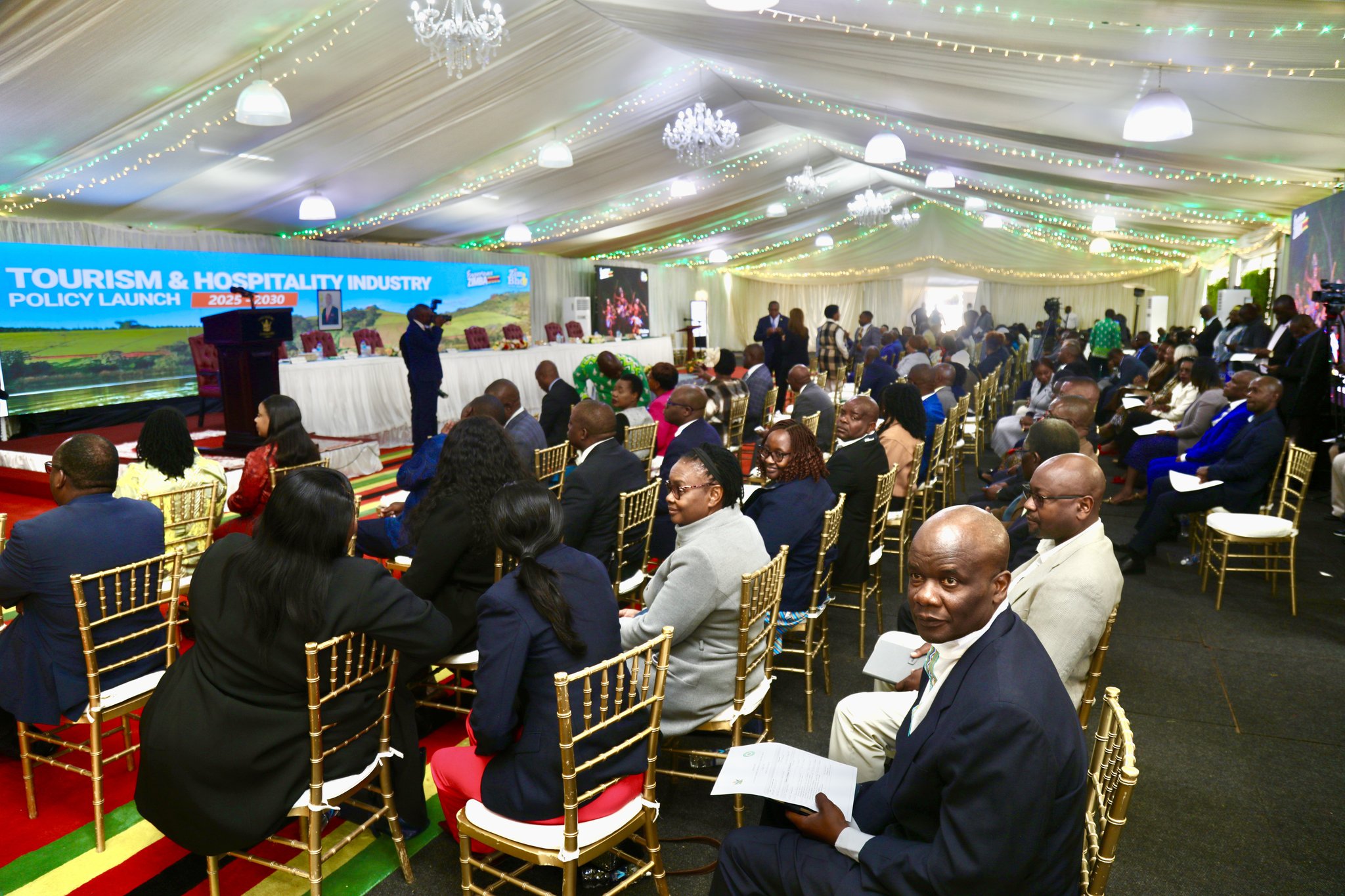Current Affairs
Zimbabwe’s Tourism Policy- a critical analysis

By Mlondolozi Ndlovu
Zimbabwe this week launched the 2025-2030 Tourism and Hospitality Industry policy which marks a renewed strategic attempt by the government of Zimbabwe to reposition tourism as a transformative pillar of national development.
This policy, launched within the framework of the country’s Vision 2030 and the National Development Strategy 1 (NSD1), has profound implications for tourism law, both in its current state and in the reforms it is likely to provoke.
While it is primarily a policy document, its provisions and guiding principles interact closely with the government that governs tourism in Zimbabwe, most notably the Tourism Act (Chapter 14:20), the Constitution and associated regulatory statutes.
From the outset, the policy is grounded in legal legitimacy. The foreword explicitly references Section 13 of the Constitution of Zimbabwe, which enshrines the principle of equitable development and mandates the state to promote sustainable and inclusive growth.
This constitutional grounding signals that the policy is not merely aspirational but also intended to inform statutory interpretation and future legal reform.
Importantly, the policy does not operate in isolation but positions itself as part of an integrated development framework that includes international instruments such as the African Union Agenda 2063 and the United Nations Sustainable Development Goals /9SDGs).
These references strengthen the normative authority of the policy and imply a need for harmonization between domestic tourism law and international standards, particularly those relating to sustainable development, heritage protection, and regional cooperation.
One of the significant aspects of the policy lies in its call for the strengthening of the tourism sector’s regulatory and institutional frameworks. The document identifies legal and regulatory as a priority.
It recognizes that the existing legal infrastructure is outdated, fragmented, and not responsive enough to the evolving needs of the tourism industry, especially in a digital world. This acknowledgment has direct implications for the Tourism Act (Chapter 14:20), which governs the licensing, promotion, and regulation of tourism services in Zimbabwe.
The policy indicates that there is a pressing need to update this legislation to address emerging sectors such as digital tourism platforms, online travel agencies, and community-based tourism enterprises.
It also suggests the introduction of new statutory instruments to strengthen compliance with quality standards, safety protocols, and consumer protection norms.
Furthermore, the policy articulates a clear agenda to decentralize tourism governance, encouraging local authorities to play a more active role in planning, infrastructure development and regulation. This has notable implications for Zimbabwe’s legal regime under the Urban Councils Act and the Rural District Councils Act, which may require amendments or new by-laws to align with the policy’s thrust towards devolved and locally driven tourism development. In this context, the policy underscores the necessity of inter-agency collaboration between Zimbabwe’s Tourism Authority, local authorities, and line ministries.
However, without a binding legal framework to facilitate and regulate such collaboration, there is a risk of institutional and legal uncertainty. Therefore, the policy implicitly calls for the enactment of legislation or statutory instruments that clearly define institutional roles, dispute resolution mechanisms, and compliance obligations across multi-stakeholder tourism governance landscape.
The policy also proposes the restructuring of the Zimbabwe Tourism Fund (ZTF) to make it more efficient, transparent, and better aligned with the objectives of domestic resource mobilization.
This proposal, while administrative in nature, cannot be realised without legislative backing. The current legal framework must be amended to reconstitute the ZTF, stipulate its funding sources, clarify its expenditure mandates, and establish mechanisms for accountability.
Similarly, the policy identifies the regulation of digital platforms and online tourism enterprises as a new frontier requiring attention. This raises important questions about how tourism law will intersect with ICT legislation, data protection regulation, and e-commerce laws. Legislative efforts will be required to bring these dimensions into a coherent legal framework that enables innovation while safeguarding national revenue, consumer rights and local operators.
Crucially, the policy reflects a strong commitment to inclusivity, gender mainstreaming, and the empowerment of youth and persons with disabilities. It mandates the state and private sector actors to promote equitable access to tourism opportunities and services. These provisions are not merely programmatic, they are in line with constitutional values and the national gender policy. However for these principles to be enforceable, they must be embedded in binding legislation. For instance, tourism laws must incorporate anti-discrimination provisions, accessibility standards for tourism infrastructure, and preferential support mechanisms for women and youth led tourism enterprises. Without such legal codification, the policy risks remaining a well-articulated but legally inert vision.
The policy also acknowledges the need to streamline licensing and registration processes, strengthening grading and inspection systems and promote good corporate governance within tourism businesses. These steps require a revision of statutory instruments, greater institutional independence for bodies such as ZTA and clearer delineation of roles between national and local authorities.
The policy’s call for compliance with tax laws is equally significant. There is an expressed desire to strengthen operational regulations and enhance tax enforcement without discouraging business growth. This implies a need for simplified tax codes, tourism specific tax incentives e.g. for eco-lodges or digital startups and greater clarity on informal sector contributions, issues that will directly inform Zimbabwe’s fiscal and legal frameworks for tourism.
A standout feature of the policy is its strong emphasis on human capital, a foundational driver of sectoral transformation. It acknowledges that tourism can only thrive where there is a skilled, ethical, and service oriented workforce.
Accordingly, it calls for training programs, university partnerships, technical and vocational education, and industry-led certification systems. However, a challenge exists in aligning curricula with real industry needs.
Tourism education must integrate customer service training, digital marketing, foreign languages, and hospitality law and safety protocols.
This human capital agenda will interact with labour laws, particularly around internships, minimum wages in hospitality, and workplace protections. Strengthening labour rights while maintaining employer flexibility will be essential.
The policy’s human development intentions also create opportunities for constitutional alignment with rights to education, equal opportunity, and access to economic resources.
Another key goal is the expansion of regional and international cooperation. The policy advocates for active participation in global tourism platforms, the hosting of expos, and engagement with foreign markets.
This diplomatic strategy intersects with international law, particularly trade and tourism agreements under the African Continental Free Trade Area, SADC protocols, and bilateral MOUs.
Cooperation also extends to cross-border tourism packages, wildlife conservation efforts, and joint heritage branding.
These require not only political will but also regulatory harmonization, visa facilitation agreements, and security coordination. The policy thus acts as a springboard for enhancing Zimbabwe’s soft power and regional integration.
Finally, the policy’s success will depend on monitoring and evaluation. Good policies often fail due to weak implementation.
Legal instruments may need to mandate periodic reporting, independent audits of the ZTF, and performance based reviews of public institutions in the sector.
Moreover, building public trust and policy legitimacy will require transparency, community participation, and clear communication. Legal frameworks must thus incorporate accountability mechanisms to ensure that this policy becomes more than just a document.
Mlondolozi Ndlovu is a legal researcher, lecturer and media practitioner. He writes in his own capacity and can be contacted on mlondo717@gmail.com or +263778351296
Current Affairs
Minister Rwodzi Charts Path as Sector Takes Lead in GDP Growth

Itai Mazire
Tourism and Hospitality Industry Minister Barbara Rwodzi has implored players in the sector to embrace innovation, sustainability, and stronger partnerships to safeguard Zimbabwe’s tourism gains, as the industry now leads national GDP growth ahead of mining and agriculture.
In a speech delivered on her behalf by Tourism Permanent Secretary Dr. Takaruza Munyanyiwa at the Hospitality Association of Zimbabwe (HAZ) Summit and Annual General Meeting in Harare today, Minister Rwodzi said the country stood at a “historic crossroads” following its recent listing by Forbes as the best destination to visit in 2025.
“This is a well-deserved accolade which we should celebrate and sustain going forward. Congratulations, makorokoto, amhlope to the service providers of the tourism and hospitality industry of Zimbabwe.”
The Minister applauded the sector’s resilience in the face of pandemics, economic headwinds, and climate-related shocks, noting that the spirit of Zimbabwean hospitality remains unbroken.
“We have continued to smile, to serve, and to tell our authentic story, hence reaping the rewards now,” she said.
Giving an update on performance, Minister Rwodzi reported that international tourist arrivals grew by 9 percent between January and September 2025 compared to the same period last year, with strong traffic from the Americas, Africa, and Asia.
Domestic travel also surged by 20.9 percent over the same period, while the sector generated approximately USD 922 million in 2025 a 10 percent rise from the USD 839 million recorded last year.
“These are encouraging signs that our recovery is gaining positive traction. But future-proofing requires more than recovery it demands transformation,” she said.
Minister Rwodzi outlined five pillars she said would anchor the transformation of the sector: digitalisation; sustainable and climate-resilient tourism; human capital development; infrastructure and connectivity; and stronger branding and market diversification.
“The future of hospitality is digital,” she said. “We must move from brochures to big data, from paper-based booking to smart platforms.”
She urged operators to embrace online booking systems, virtual reality tourism aids, and other digital tools that enhance visitor experiences.
On sustainability, Minister Rwodzi said protecting Zimbabwe’s natural and cultural heritage was “not an expense it is an investment in the longevity of our industry.”
The Minister stressed the need to invest in human capital, calling on operators to work closely with academia to bridge skills gaps and develop tomorrow’s hospitality innovators. She highlighted the First Lady, Dr. Auxillia Mnangagwa’s gastronomy vision as a key avenue for elevating Zimbabwe’s culinary offerings.
On infrastructural development across the country, she said it remained central to competitiveness: “A tourist’s journey begins long before they reach our front desk — it begins on a road, a runway, or a mobile network.”
Minister Rwodzi reiterated that Government is committed to creating an enabling environment, pointing to the recent reduction of tourism fees by up to 50 percent to lower operating costs.
“Future-proofing cannot be achieved by Government alone,” she said. “The private sector is the engine of creativity, investment, and service excellence.”
Her call for collaboration was anchored on an African proverb which states that, “Tomorrow belongs to the people who prepare for it today.”
The Minister said the role of HAZ remained critical as Zimbabwe eyes increased international tourist inflows.
“The world’s eyes are turning towards Zimbabwe. We have the assets, we have the people, we have the passion so why not?” she said.
“To HAZ, your role has never been more critical. You are the unified voice of the hospitality industry. Your strength lies in your collective action.”
She said the ongoing summit provided a platform to “strategise, innovate, and build consensus” as the sector pushes towards Vision 2030.
“The potential is vast. The time is now. Let us build not just an industry, but a legacy,” said Minister Rwodzi.
Current Affairs
Apostolic Church Founder Paul Mwazha Dies at 107

Zimbabwe and the wider African Christian community are mourning the loss of Bishop Paul Mwazha, the revered founder of the Apostolic Church in Africa, who passed away today at the remarkable age of 107.
Bishop Mwazha, widely regarded as one of the continent’s most influential religious leaders, dedicated his life to the growth and spiritual guidance of his church, which boasts millions of followers across Zimbabwe and beyond. His teachings, rooted in faith, discipline, and community service, have left an enduring legacy that continues to shape generations.
The Apostolic Church in Africa under his leadership became a cornerstone of spiritual life in many communities, providing not only religious guidance but also social support and education initiatives. Church leaders have called for prayers as they prepare for national and regional mourning rituals.
Further details on funeral arrangements and memorial services are expected to be released in the coming days.
Business
Zimbabwe Bets Big on Biotech to Fuel Industrial Revolution


Dr. Eng. Willie Ganda
By Enia Dube
The Minister of Higher and Tertiary Education, Innovation, Science and Technology Development, Hon. Dr Fredrick Shava, has thrown his weight behind biotechnology as a key driver of the country’s industrialisation and modernisation agenda.
Speaking at the National Biotechnology Authority (NBA) Strategic Planning Workshop in Kadoma, Dr Shava urged the Authority to identify biotechnology-led opportunities that can boost national production and accelerate economic growth.
“Biotechnology serves as a key catalyst for NDS2 implementation, advancing inclusive economic growth, job creation, and sustainable industrial development,” Dr Shava said, emphasising the need to integrate biotechnology into national value chains to unlock a biotechnology-driven economy. He added that this would turn innovation into industry, knowledge into enterprise, and science into jobs.
The NBA has made notable progress in establishing a strong regulatory framework, promoting biotechnology research and commercialisation, and raising public awareness about the sector’s potential. The Authority has successfully commercialised products such as Mapfura wine and Cofsol cough syrup, and has several other biotechnology products in the pipeline.
Incoming NBA Board Chairperson, Professor Idah Sithole-Niang, echoed Dr Shava’s sentiments, emphasising that the Authority’s five-year strategic plan must meaningfully contribute to the attainment of Vision 2030. “This event marks a significant milestone in the Authority’s ongoing efforts to enhance the role of biotechnology in Zimbabwe’s socio-economic development,” she said.
The workshop aimed to realign priorities and resources in response to emerging technologies and global biotechnology trends, and develop a strategic roadmap to strengthen biotechnology as a key driver of Zimbabwe’s socio-economic transformation. The rapidly evolving global biotechnology landscape, including advancements in gene editing, bio-manufacturing, and climate-smart innovations, presents both new opportunities and challenges for Zimbabwe.
“We recognise the pressing need for an inclusive and forward-looking strategic plan that can navigate the complexities of the biotechnology landscape,” Professor Sithole-Niang noted. The workshop was attended by researchers, government officials, and NBA staff, who are optimistic about the potential of biotechnology to drive Zimbabwe’s economic transformation and achieve Vision 2030.
-

 Current Affairs1 week ago
Current Affairs1 week agoOperation restore order
-

 Crime and Courts2 months ago
Crime and Courts2 months agoMasasi High School Abuse Scandal Sparks Public Outcry
-

 Crime and Courts2 months ago
Crime and Courts2 months agoKuwadzana Man Jailed for Reckless Driving and Driving Without a Licence
-

 Current Affairs3 months ago
Current Affairs3 months agoMunhumutapa Day: Zimbabwe’s Newest Public Holiday Set for Annual Observance
-

 Current Affairs4 months ago
Current Affairs4 months agoBreaking: ZIMSEC June 2025 Exam Results Now Available Online
-

 Current Affairs1 month ago
Current Affairs1 month agoBREAKING NEWS: ZANU PF Director General Ezekiel Zabanyana Fired
-

 Current Affairs3 months ago
Current Affairs3 months agoGovernment Bans Tinted Car Windows in Nationwide Crime Crackdown
-

 Current Affairs2 months ago
Current Affairs2 months agoExposed: Harare GynecologistChirume Accused of Negligence, Extortion, and Abuse







